- Home
- Robert Rankin
The Hollow Chocolate Bunnies of the Apocalypse Page 2
The Hollow Chocolate Bunnies of the Apocalypse Read online
Page 2
‘What is this?’ the farmer asked.
‘A weapon,’ said the lad. ‘A clockwork weapon. I built it myself for use in such eventualities as this. Its spring projects a sharpened metal missile at an alarming speed. Far faster than one might hurl a rock.’
‘Bluff and bluster,’ growled the farmer, swinging back his rockholding hand, preparatory to a hurl.
The lad raised his clockwork pistol and shot off the farmer’s left ear. Which came as a shock to them both, though possibly more to the farmer.
‘Waaaaaaaaah!’ shrieked the man, dropping his unhurled rock onto his foot, which added broken toes to his woeful account.
‘Your purse,’ said the lad, waving his gun in a now most shaky hand.
‘Waaaaaaaah! I am wounded!’ The farmer took to hopping and clutching at his maimed head.
‘The next shot will pass directly through your heart.’
‘No,’ croaked the farmer, ‘no no no.’
‘The world will be a better place without you in it.’ The lad steadied his pistol with both hands. ‘You are a monster.’
‘And you are an iconoclast,’ moaned the farmer, still hopping. ‘With no respect for tradition.’
‘Such is indeed the truth. Now hand me your purse. You are losing a great deal of blood. It would be well for you to return to your farmhouse and have your wife dress your wounds.’
‘Damn you,’ said the farmer, adding profanities to these words.
‘Your purse, now!’
The farmer grudgingly produced his purse. It was a weighty purse, full as it was with the gold of a foolish boy who had passed that way earlier in the day and failed to heed the farmer’s advice. This foolish boy presently hung in joints in the farmer’s smoking house.
‘On second thoughts,’ said the lad, ‘I think it would be for the best if you went down into the hole.’
‘What?’ cried the farmer. ‘What?’
‘The path is narrow,’ said the lad. ‘Your horse might stumble into that hole, if it doesn’t have something to place its hoof upon.’
‘What?’ the farmer cried again.
‘I mean to borrow your horse; I have walked enough for one day.’
‘This is outrageous. Preposterous.’
‘Best to get it over with as quickly as possible. Before you bleed to death.’
‘But the hole.’ The farmer ceased his hopping and stared down into the hole. ‘The spikes. I am not so scrawny as you.’
‘Spare,’ said the lad. ‘Wiry.’
‘I will puncture myself.’
‘That’s a chance we’ll have to take. The hole, or die where you stand.’
‘But the spikes …’
‘Perhaps fate will smile upon you.’
‘Fate wears a somewhat glum face at present.’
‘Really? Yet I would swear that it grins in my direction.’
‘You …’ The farmer spoke further profanity.
‘The hole, and now.’ The lad cocked his clockwork pistol.
The farmer, groaning and moaning, lowered himself into the hole.
The lad tucked his weapon back into his sleeve, stepped over to the farmer’s horse and detached it from the cart. Then he leapt onto the horse’s back and prepared to gallop away. ‘I’ve never ridden a horse before,’ he called down to the farmer, ‘so this should be something of an adventure.’
‘I hope you are thrown and break your neck,’ called the farmer.
‘What was that?’
‘Nothing. May good luck attend you.’
‘Thank you very much. And what is the name of this mount, farmer?’
‘Anthrax,’ called the farmer. ‘But he’ll not answer to your commands. Quite the reverse, in fact.’
‘I’m sure Anthrax and I will get along fine.’ The lad held Anthrax by his reins. ‘And so we say farewell, master farmer. Our acquaintance has been brief, but it has been instructive. We have both learned something, so let us not part upon bad terms.’
‘I am stuck fast.’ The farmer huffed and puffed and moaned and groaned. ‘I might well die in this hole.’
‘If no one comes looking for you, then in a day or two you’ll be slim enough to climb out. Or perhaps loss of blood will facilitate a more immediate shrinkage and you’ll be home in time for tea.’
‘You filthy …’
‘Quite enough,’ called the lad. ‘Your conversation tires me. I will now take my leave for the city. One day I will return this way with great wealth. Though not along this particular path.’
‘One thing before you go.’ The farmer raised his voice.
‘And what thing is this?’
‘Tell me only your name.’
‘My name?’ said the lad. ‘My name is Jack.’
‘That is good,’ called the farmer. ‘A man may not truly lay a curse upon another man without first knowing his name. I curse you, Jack. May you never know wealth. May all that you wish for be denied you.’
‘A spiteful sentiment,’ said Jack. ‘And so farewell.’ Jack dug his heels into Anthrax and Anthrax sprang forward.
The farmer, unable to duck his head, was heavily hooved upon.
2
Anthrax the horse jogged merrily along. There was a definite spring in his four-legged step. Freed from his death-cart constraints, he appeared a very happy horse indeed.
Jack, although pleased to be no longer walking, did not altogether share the horse’s joy. Precariously perched, and lacking for equestrian skills, he clung to the horse’s reins and counselled the beast to slow down a bit.
Which it didn’t.
The path meandered, as paths often do, around grassy knolls and down through dingly dells. All was rural charm and niceness, all of which was lost upon Jack. He was rather peeved, was Jack. Peeved and altogether unsettled. He was peeved about falling into the farmer’s hole. That had been a foolish thing to do. He should have listened more carefully to the farmer’s warnings. To the phrasing of them. Jack’s failure to interpret the farmer’s words correctly had come close to costing him his life. That was very peeving indeed.
Regarding the altogether unsettledness, this was a twofold business. All that blood which had flowed from the farmer’s maimed head: that was unsettling enough, but the fact that Jack had not actually meant to shoot the farmer’s ear off in the first place was doubly unsettling. This had called into question the accuracy of Jack’s clockwork pistol. He had meant to shoot the farmer in the knee. There would have to be a lot of work done upon that pistol if it was to prove any use at all as an accurate means of defence.
Anthrax kicked his back legs in the air, all but unseating Jack.
‘Calm yourself,’ cried the lad. ‘No need to go mad, take it easy, please.’
The horse did a skip or two and settled into a trot.
‘Slow down, please.’
The horse did not slow down.
The meandering path met up with a rugged track and Jack caught a glimpse of a signpost. It read TO THE CITY in fine big capitals.
‘Jolly good show,’ said Jack. ‘Please slow down a bit, please.’
The horse began to canter.
‘No!’ Jack flung himself forward and clasped his arms about Anthrax’s neck.
‘Slow down!’ he shouted into the horse’s left ear. ‘Slow down or I’ll sell you for cat meat when we reach the city.’
The horse began to gallop.
‘No!’ shouted Jack, now altogether ruffled. ‘Slow down! Slow down! No!’
If there is a faster thing than galloping that horses can do, this horse began to do it now.
Jack closed his eyes tightly and steeled himself for the inevitable concussion and imminent doom that awaited him.
Anthrax thundered forward, his hooves raising sparks on the rugged track, his ears laid back and a fair old froth a-forming round his mouth. The horse appeared possessed.
Eyes tight shut and mouth shouting, ‘Slow down please,’ Jack was borne along at the speed which is commonly known as breaknec
k.
The horse would not obey his commands. Quite the reverse, in fact.
And then Jack opened his eyes and a very broad smile appeared on his face. ‘Faster!’ he shouted. ‘Yes boy, yes, faster! Faster! Faster!’
The horse slowed down to a gallop.
‘Faster!’ shouted Jack. ‘Come on!’
The horse slowed down to a canter.
‘Faster!’
A trot.
‘Faster!’
A jog.
‘Faster!’
The horse, all sweaty and breathless, slowed down to a gentle stroll.
‘And faster.’
Anthrax came to a halt.
Jack released his grip from the horse’s streaming neck and slid himself down onto the ground. He patted the horse on an area known as a flank, then stroked its foaming muzzle parts.
‘I should have known,’ said Jack, taking deep breaths to steady himself. ‘I’m sorry, boy. It was all my fault, wasn’t it?’
The horse made a kind of grumbling sound, as if it understood.
‘The damnable farmer trained you, didn’t he, boy? He trained you to go faster if you were told to go slower and likeways round. In case anyone stole you. I remembered what he said: “He’ll not answer to your commands. Quite the reverse in fact.” And I’m sure that when you had eventually unseated your rider and tired yourself out, you’d have wandered home of your own accord. It seems that I have much to learn of the ways of the world. I will be very much on my guard from now on.’
Jack led Anthrax on along the rugged track. Presently they came upon a horse trough and both drank from it. Suitably refreshed, Jack climbed back onto the horse.
‘Stop,’ said he, and the horse set off at a gentle pace.
The rugged track led now up a sizeable hill and Anthrax took to plodding. Jack sighed deeply, but, feeling for the animal which, he surmised, hadn’t exactly lived a life of bliss so far, climbed down once more and plodded beside it.
The track led up and up. The sizeable hill seemed little less big than a small mountain. Jack huffed and puffed, and Anthrax did likewise.
‘Good lad,’ said Jack. ‘We’re almost there, I think.’
And almost there they were.
And then they were altogether there.
And Jack, still huffing and puffing, with blue sweat striping his face, hands upon knees and heart going bumpty-bumpty-bump, raised his squinting eyes to view what vista lay beyond.
And then he opened both his eyes and his mouth, very wide indeed.
For beyond, across a plain of grey and stunted furze, lay THE CITY.
Writ big in letters. Large and capital.
‘Whoa,’ went Jack, taking stock of whatever he could. ‘Now that is a very BIG CITY.’
And as cities go, and in these parts, but for this one, they didn’t, it was indeed a very BIG CITY.
And a very dirty city too, from what Jack could see of it. A great dark sooty blot upon the landscape was this city. A monstrous smut-coloured carbuncle.
Anthrax the horse made a very doubtful face. Which is quite a feat for an equine. Jack cast a glance at this very doubtful face. ‘I know what you mean,’ he said. ‘It doesn’t look too welcoming, does it?’
The horse shook its head.
‘You’re a very wise horse,’ said Jack. ‘And I apologise for that earlier remark of mine about having you converted into cat meat. If you get me in one piece to the city, I’ll see that you’re well cared for. But,’ and he stared once more towards the distant conurbation, ‘that is one ugly-looking eyesore of a city. Perhaps your previous owner was right in all he said. But we must remain optimistic. Shall we proceed?’
The horse shook its head.
‘You would rather return to haul corpses?’
The horse shook its head once more.
Jack now shook his own. ‘I’m talking to a horse,’ he said to himself. ‘The events of today have unhinged my mind.’
The sun, Jack noticed, was now very low in the heavens. The blue of the sky had deepened and the day was drawing towards night.
‘We’d best get a move on,’ Jack told Anthrax. ‘I need to fill my belly and find myself lodgings for the night.’ He shinned once more onto the horse’s back, told it to stop, and set off.
The rugged track wound down the biggish hill/smallish mountain and presently joined a paved and city-bound road. This pushed onwards through the grey and stunted furze. Onwards and onwards and onwards. Ahead, the city loomed, its outlying districts becoming more clearly defined. Jack was not impressed by what he saw. The road reached peasant huts, crude and weathered. Strange and pale little faces peeped out at him through glassless windows. Jack dug in his heels. ‘Slower,’ he told Anthrax, ‘slower, boy.’
Anthrax got a trot on.
Beyond the peasant huts lay what Jack correctly assumed to be the industrial district: grim, grey factories with chimneys coughing smoke. The air was rank, and Jack took to covering his nose.
‘Not very nice around here.’ Jack patted Anthrax’s neck. ‘This is the kind of place I left behind, factories like this. But let us not be downhearted. I’m sure we can find a pleasant hostelry in a nicer part of the city.’
The sun was beginning to set.
At length, but a length too long for Jack’s liking, the industrial district lay astern, or the equine equivalent thereof. Now the buildings showed traces of colour: a hint of yellow here and a dash of orange there. A trifle dusted over, but a definite improvement.
The style of architecture was new to Jack, and therefore looked exotic. The buildings were constructed from huge square bricks, each embossed with a letter of the alphabet. But these had not been laid in order to spell out words, but apparently at random.
Suddenly something rushed past Jack and his mount, causing Anthrax to panic. Jack shouted ‘Faster!’ very loudly indeed and Anthrax jerked to a halt. Jack viewed the rapidly diminishing rusher: some kind of mechanical vehicle.
‘Car,’ said Jack. ‘Nothing to be afraid of. I worked upon cars at the factory. Went like the wind, though, didn’t it, boy? I’ll be having one of those myself some day soon.’
Anthrax shook his head about.
‘Oh yes I will,’ said Jack. ‘Stop then, boy. We have to find a hostelry soon or I’ll fall off your back from hunger.’
The sun was all but gone now, but light shone all around, from bright lanterns held aloft by iron columns that rose at either side of the road at intervals of fifty paces. These lit buildings that showed brighter colours now, reds and greens and blues, all in alphabet brick.
The colours raised Jack’s spirits. ‘Almost there,’ he told Anthrax. ‘A warm stable and a manger of hay will shortly be yours.’
Anthrax, all but exhausted, plodded onward.
‘Listen,’ said Jack. ‘It’s been a difficult day for the both of us. But you’ve got me here. I’ll see you all right. You’re a good horse. Hey, hey, what’s that I see ahead?’
What Jack saw ahead was this: a long, low building painted all in a hectic yellow. A sign, wrought from neon, flashed on and off, as such signs are wont to do. Words were spelled out by this sign. The words were Nadine’s Diner.
‘There,’ cried Jack. ‘An eatery.’
If horses can sigh, then Anthrax did. And as they reached Nadine’s Diner, Jack clambered down, secured Anthrax’s reins to a post which may or may not have been there for the purpose, promised the horse food and drink, as soon as he had taken some for himself, squared up his narrow, sagging shoulders and put his hand to the restaurant door.
The door was an all-glass affair, somewhat cracked and patched, but none the less serviceable. Jack pushed upon it and entered the establishment.
It wasn’t exactly a home from home.
Unoccupied tables and chairs were arranged to no particular pattern. Music of an indeterminate nature drifted from somewhere or other. A bar counter, running the length of the long, low room, was attended by a single fellow, dressed in the manner of
a chef. He viewed Jack’s arrival with a blank expression – but a blank expression mostly shadowed, for several bulbs had gone above the bar and he obviously hadn’t got around to replacing them.
Jack steered his weary feet across a carpet that was much of a muchness as carpets went, but hardly much of anything as they might go. He squared up his shoulders somewhat more, squinted towards the dimly lit chef and hailed this fellow thusly:
‘Good evening to you, chef,’ hailed Jack.
‘Eh?’ replied the other in ready response.
‘A good evening,’ said Jack. And, glancing around the deserted restaurant, ‘Business is quiet this evening.’
‘Is it?’ The chef cast his shadowed gaze over Jack. ‘You’re blue,’ he observed. ‘Why so this facial blueness? Is it some new whim of fashion from the House of Oh Boy! that I am hitherto unacquainted with? Should I be ordering myself a pot of paint?’
‘Inferior cap,’ said Jack, taking off his inferior cap and wiping his face with it.
‘That’s made matters worse,’ said the chef.
‘Might I see a menu?’ Jack asked.
The barlord scratched his forehead, then wiped his scratching hand upon his apron. ‘Is that a trick question?’ he asked. ‘Because I can’t be having with trick questions. Chap came in here a couple of weeks ago and said to me, “Do you know that your outhouse is on fire?” and I said to him, “Is that a trick question?” and he said to me, “No it isn’t.” And I was pleased about that, see, because I can’t be having with trick questions. But damn me, if I didn’t take a crate of empties outside about an hour later to find that my outhouse had been burned to the ground. What do you make of a thing like that, eh?’
Jack shrugged.
‘And well may you shrug,’ said the chef. ‘So your question is not a trick question?’
‘No,’ said Jack, ‘it’s not.’
‘That’s fine then,’ said the chef. ‘How may I help you, sir?’
‘I’d like something to eat, if I may,’ said Jack. ‘And a stable for my horse and directions to where I might find a room for the night.’
‘God’s Big Box,’ said the barlord. ‘It’s want want want with you, isn’t it? Were you breast-fed as a baby?’

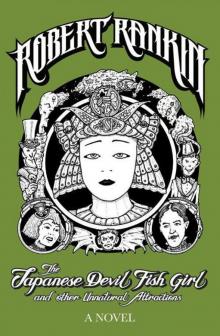 The Japanese Devil Fish Girl and Other Unnatural Attractions
The Japanese Devil Fish Girl and Other Unnatural Attractions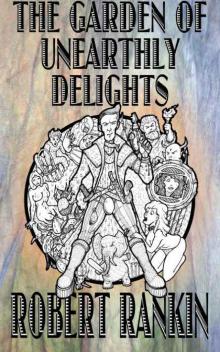 The Garden of Unearthly Delights
The Garden of Unearthly Delights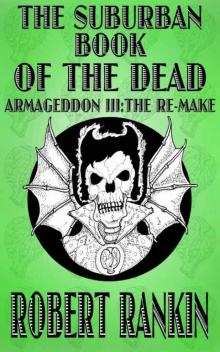 The Suburban Book of the Dead: Armageddon III: The Remake
The Suburban Book of the Dead: Armageddon III: The Remake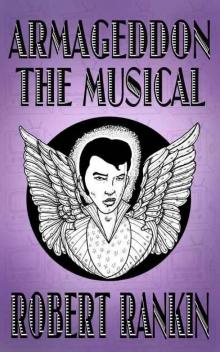 Armageddon_The Musical (Armageddon Trilogy Book 1)
Armageddon_The Musical (Armageddon Trilogy Book 1)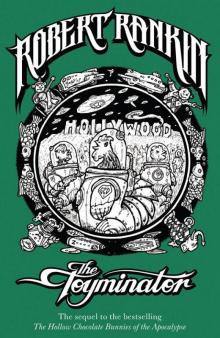 The Toyminator
The Toyminator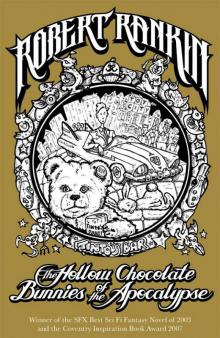 The Hollow Chocolate Bunnies of the Apocalypse
The Hollow Chocolate Bunnies of the Apocalypse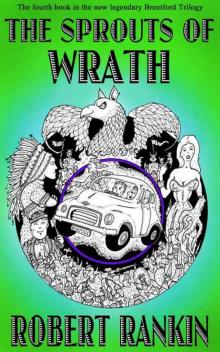 The Sprouts of Wrath
The Sprouts of Wrath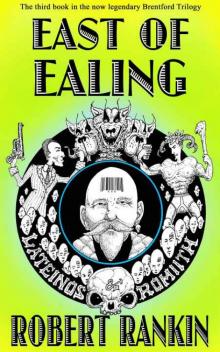 East of Ealing
East of Ealing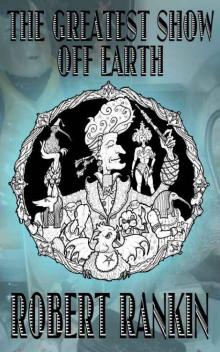 The Greatest Show Off Earth
The Greatest Show Off Earth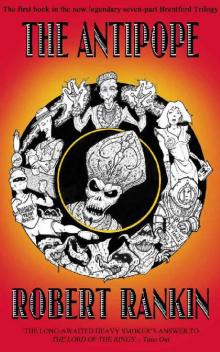 The Antipope
The Antipope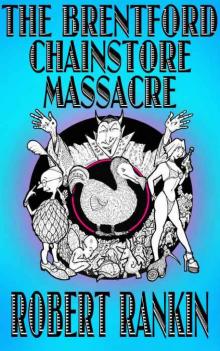 The Brentford Chainstore Massacre
The Brentford Chainstore Massacre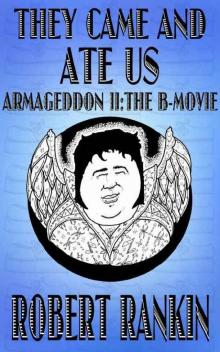 They Came and Ate Us_The B-Movie (Armageddon Trilogy 2)
They Came and Ate Us_The B-Movie (Armageddon Trilogy 2)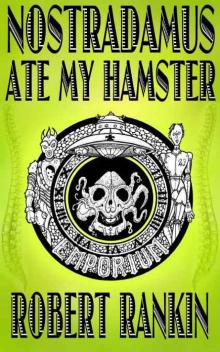 Nostradamus Ate My Hamster
Nostradamus Ate My Hamster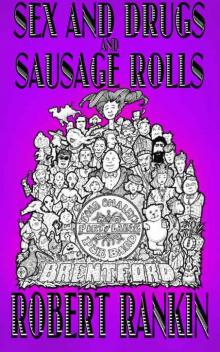 Sex and Drugs and Sausage Rolls
Sex and Drugs and Sausage Rolls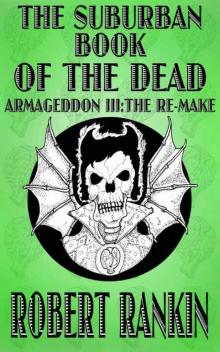 The Suburban Book of the Dead_The Remake (Armageddon Trilogy 3)
The Suburban Book of the Dead_The Remake (Armageddon Trilogy 3)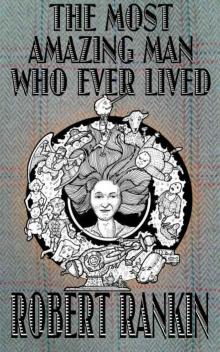 The Most Amazing Man Who Ever Lived
The Most Amazing Man Who Ever Lived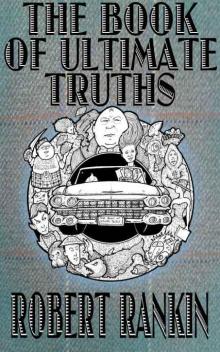 The Book of Ultimate Truths
The Book of Ultimate Truths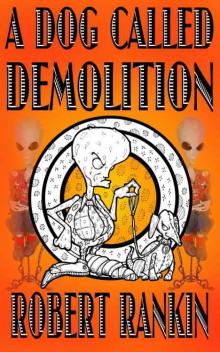 A Dog Called Demolition
A Dog Called Demolition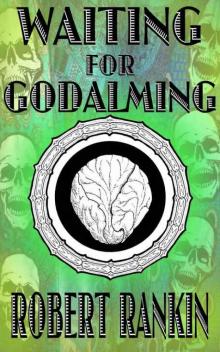 Waiting for Godalming
Waiting for Godalming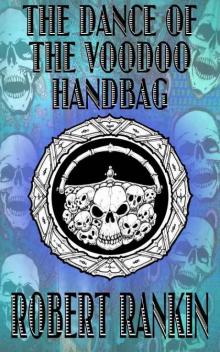 The Dance of the Voodoo Handbag
The Dance of the Voodoo Handbag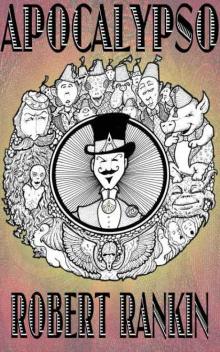 Apocalypso
Apocalypso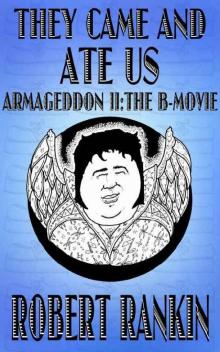 They Came and Ate Us: Armageddon II: The B-Movie
They Came and Ate Us: Armageddon II: The B-Movie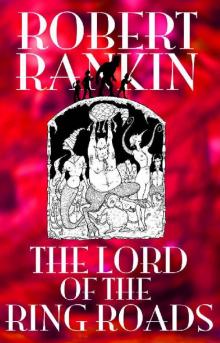 The Lord of the Ring Roads
The Lord of the Ring Roads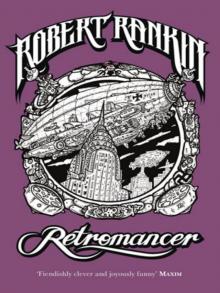 Retromancer
Retromancer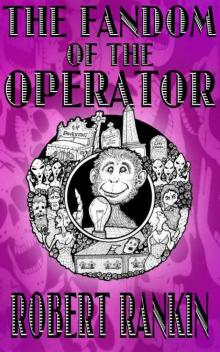 The Fandom of the Operator
The Fandom of the Operator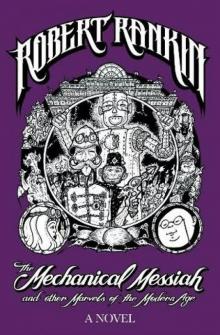 The Mechanical Messiah and Other Marvels of the Modern Age
The Mechanical Messiah and Other Marvels of the Modern Age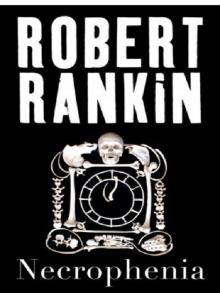 Necrophenia
Necrophenia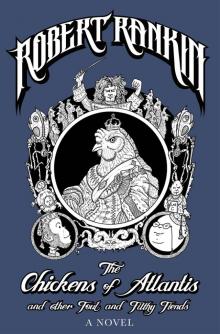 The Chickens of Atlantis and Other Foul and Filthy Fiends
The Chickens of Atlantis and Other Foul and Filthy Fiends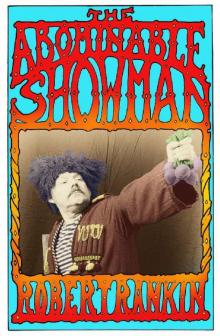 The Abominable Showman
The Abominable Showman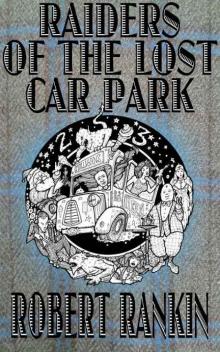 Raiders of the Lost Carpark
Raiders of the Lost Carpark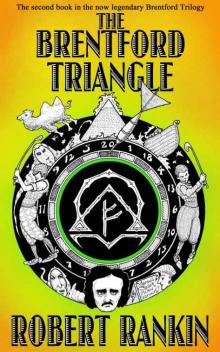 The Brentford Triangle
The Brentford Triangle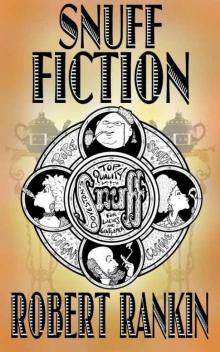 Snuff Fiction
Snuff Fiction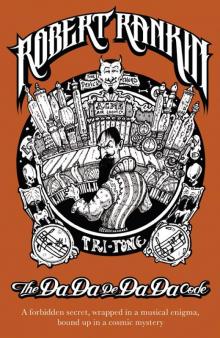 The Da-Da-De-Da-Da Code
The Da-Da-De-Da-Da Code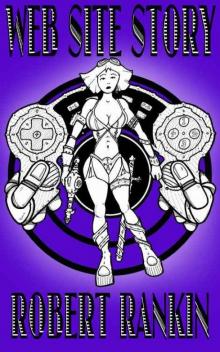 Web Site Story
Web Site Story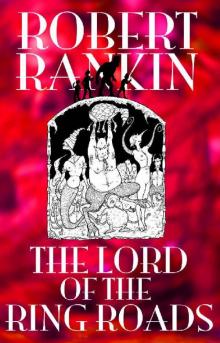 The Lord of the Ring Roads (The Final Brentford Trilogy Book 1)
The Lord of the Ring Roads (The Final Brentford Trilogy Book 1)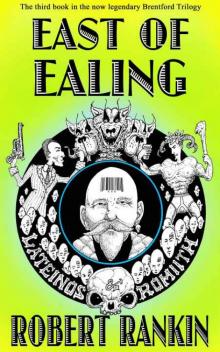 East of Ealing (The Brentford Trilogy Book 3)
East of Ealing (The Brentford Trilogy Book 3)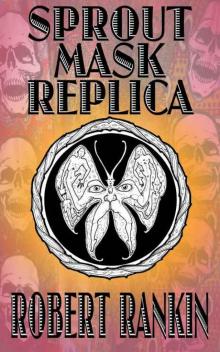 Sprout Mask Replica (Completely Barking Mad Trilogy Book 1)
Sprout Mask Replica (Completely Barking Mad Trilogy Book 1)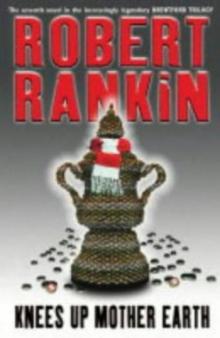 Knees Up Mother Earth bs-7
Knees Up Mother Earth bs-7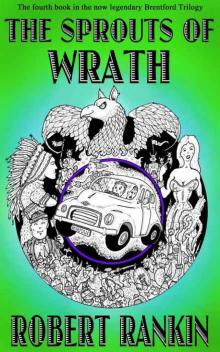 The Sprouts of Wrath (The Brentford Trilogy Book 4)
The Sprouts of Wrath (The Brentford Trilogy Book 4)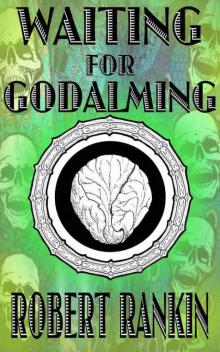 Waiting for Godalming (Completely Barking Mad Trilogy Book 3)
Waiting for Godalming (Completely Barking Mad Trilogy Book 3)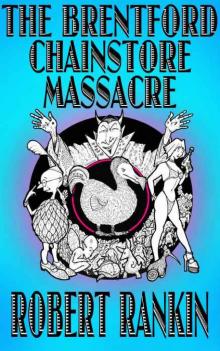 The Brentford Chainstore Massacre (The Brentford Trilogy Book 5)
The Brentford Chainstore Massacre (The Brentford Trilogy Book 5)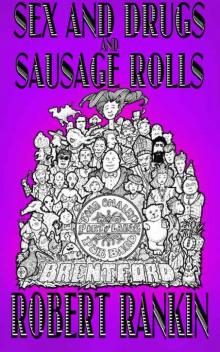 Sex and Drugs and Sausage Rolls (The Brentford Trilogy Book 6)
Sex and Drugs and Sausage Rolls (The Brentford Trilogy Book 6)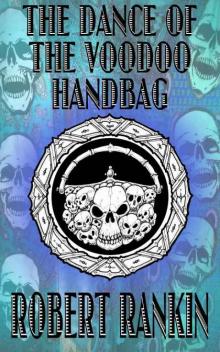 The Dance of the Voodoo Handbag (Completely Barking Mad Trilogy Book 2)
The Dance of the Voodoo Handbag (Completely Barking Mad Trilogy Book 2)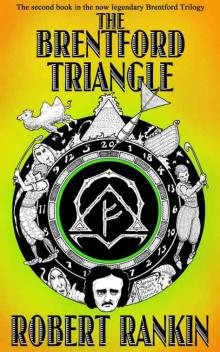 The Brentford Triangle (The Brentford Trilogy Book 2)
The Brentford Triangle (The Brentford Trilogy Book 2)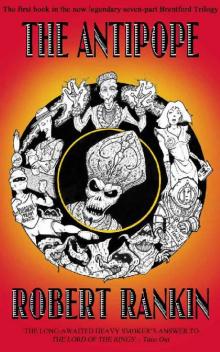 The Antipope (The Brentford Trilogy Book 1)
The Antipope (The Brentford Trilogy Book 1)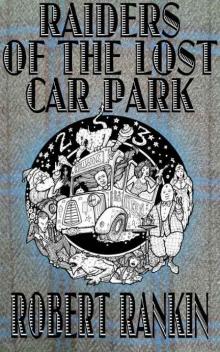 Raiders of the Lost Car Park (The Cornelius Murphy Trilogy Book 2)
Raiders of the Lost Car Park (The Cornelius Murphy Trilogy Book 2)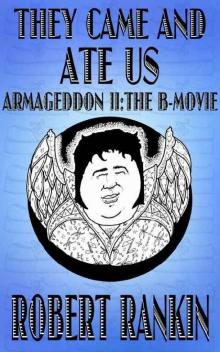 They Came and Ate Us - Armageddon II_The B-Movie (Armageddon Trilogy Book 2)
They Came and Ate Us - Armageddon II_The B-Movie (Armageddon Trilogy Book 2)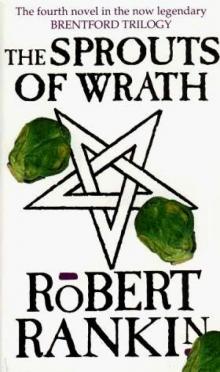 The Sprouts of Wrath bs-4
The Sprouts of Wrath bs-4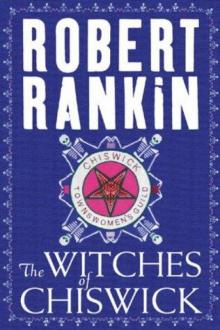 The Witches of Chiswick
The Witches of Chiswick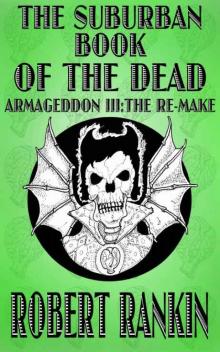 The Suburban Book of the Dead - Armageddon III: The Remake (Armageddon Trilogy 3)
The Suburban Book of the Dead - Armageddon III: The Remake (Armageddon Trilogy 3)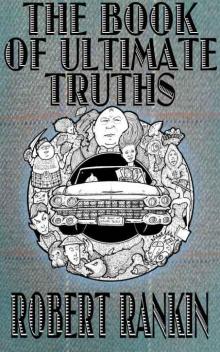 The Book of Ultimate Truths (The Cornelius Murphy Trilogy 1)
The Book of Ultimate Truths (The Cornelius Murphy Trilogy 1)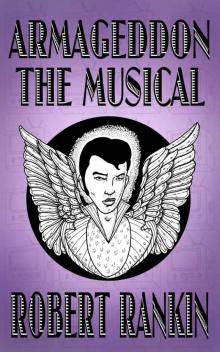 Armageddon: The Musical (Armageddon Trilogy)
Armageddon: The Musical (Armageddon Trilogy)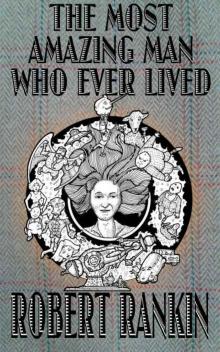 The Most Amazing Man Who Ever Lived (The Cornelius Murphy Trilogy Book 3)
The Most Amazing Man Who Ever Lived (The Cornelius Murphy Trilogy Book 3)